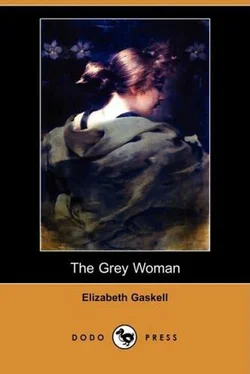"Dost thou know any fault or crime in this man that should prevent God's blessing from resting on thy marriage with him? Dost thou feel aversion or repugnance to him in any way?"
And to all this what could I say? I could only stammer out that I did not think I loved him enough; and my poor old father saw in this reluctance only the fancy of a silly girl who did not know her own mind, but who had now gone too far to recede.
So we were married, in the Court chapel, a privilege which Madame Rupprecht had used no end of efforts to obtain for us, and which she must have thought was to secure us all possible happiness, both at the time and in recollection afterwards.
We were married; and after two days spent in festivity at Carlsruhe, among all our new fashionable friends there, I bade good-by for ever to my dear old father. I had begged my husband to take me by way of Heidelberg to his old castle in the Vosges; but I found an amount of determination, under that effeminate appearance and manner, for which I was not prepared, and he refused my first request so decidedly that I dared not urge it. "Henceforth, Anna," said he, "you will move in a different sphere of life; and though it is possible that you may have the power of showing favour to your relations from time to time, yet much or familiar intercourse will be undesirable, and is what I cannot allow." I felt almost afraid, after this formal speech, of asking my father and Fritz to come and see me; but, when the agony of bidding them farewell overcame all my prudence, I did beg them to pay me a visit ere long. But they shook their heads, and spoke of business at home, of different kinds of life, of my being a Frenchwoman now. Only my father broke out at last with a blessing, and said, "If my child is unhappy—which God forbid—let her remember that her father's house is ever open to her." I was on the point of crying out, "Oh! take me back then now, my father! oh, my father!" when I felt, rather than saw, my husband present near me. He looked on with a slightly contemptuous air; and, taking my hand in his, he led me weeping away, saying that short farewells were always the best when they were inevitable.
It took us two days to reach his château in the Vosges, for the roads were bad and the way difficult to ascertain. Nothing could be more devoted than he was all the time of the journey. It seemed as if he were trying in every way to make up for the separation which every hour made me feel the more complete between my present and my former life. I seemed as if I were only now wakening up to a full sense of what marriage was, and I dare say I was not a cheerful companion on the tedious journey. At length, jealousy of my regret for my father and brother got the better of M. de la Tourelle, and he became so much displeased with me that I thought my heart would break with the sense of desolation. So it was in no cheerful frame of mind that we approached Les Rochers, and I thought that perhaps it was because I was so unhappy that the place looked so dreary. On one side, the château looked like a raw new building, hastily run up for some immediate purpose, without any growth of trees or underwood near it, only the remains of the stone used for building, not yet cleared away from the immediate neighbourhood, although weeds and lichens had been suffered to grow near and over the heaps of rubbish; on the other, were the great rocks from which the place took its name, and rising close against them, as if almost a natural formation, was the old castle, whose building dated many centuries back.
It was not large nor grand, but it was strong and picturesque, and I used to wish that we lived in it rather than in the smart, half-furnished apartment in the new edifice, which had been hastily got ready for my reception. Incongruous as the two parts were, they were joined into a whole by means of intricate passages and unexpected doors, the exact positions of which I never fully understood. M. de la Tourelle led me to a suite of rooms set apart for me, and formally installed me in them, as in a domain of which I was sovereign. He apologised for the hasty preparation which was all he had been able to make for me, but promised, before I asked, or even thought of complaining, that they should be made as luxurious as heart could wish before many weeks had elapsed. But when, in the gloom of an autumnal evening, I caught my own face and figure reflected in all the mirrors, which showed only a mysterious background in the dim light of the many candles which failed to illuminate the great proportions of the half-furnished salon, I clung to M. de la Tourelle, and begged to be taken to the rooms he had occupied before his marriage, he seemed angry with me, although he affected to laugh, and so decidedly put aside the notion of my having any other rooms but these, that I trembled in silence at the fantastic figures and shapes which my imagination called up as peopling the background of those gloomy mirrors. There was my boudoir, a little less dreary—my bedroom, with its grand and tarnished furniture, which I commonly made into my sitting-room, locking up the various doors which led into the boudoir, the salon, the passages—all but one, through which M. de la Tourelle always entered from his own apartments in the older part of the castle. But this preference of mine for occupying my bedroom annoyed M. de la Tourelle, I am sure, though he did not care to express his displeasure. He would always allure me back into the salon, which I disliked more and more from its complete separation from the rest of the building by the long passage into which all the doors of my apartment opened. This passage was closed by heavy doors and portières, through which I could not hear a sound from the other parts of the house, and, of course, the servants could not hear any movement or cry of mine unless expressly summoned. To a girl brought up as I had been in a household where every individual lived all day in the sight of every other member of the family, never wanted either cheerful words or the sense of silent companionship, this grand isolation of mine was very formidable; and the more so, because M. de la Tourelle, as landed proprietor, sportsman, and what not, was generally out of doors the greater part of every day, and sometimes for two or three days at a time. I had no pride to keep me from associating with the domestics; it would have been natural to me in many ways to have sought them out for a word of sympathy in those dreary days when I was left so entirely to myself, had they been like our kindly German servants. But I disliked them, one and all; I could not tell why. Some were civil, but there was a familiarity in their civility which repelled me; others were rude, and treated me more as if I were an intruder than their master's chosen wife; and yet of the two sets I liked these last the best.
The principal male servant belonged to this latter class. I was very much afraid of him, he had such an air of suspicious surliness about him in all he did for me; and yet M. de la Tourelle spoke of him as most valuable and faithful. Indeed, it sometimes struck me that Lefebvre ruled his master in some things; and this I could not make out. For, while M. de la Tourelle behaved towards me as if I were some precious toy or idol, to be cherished, and fostered, and petted, and indulged, I soon found out how little I, or, apparently, any one else, could bend the terrible will of the man who had on first acquaintance appeared to me too effeminate and languid to exert his will in the slightest particular. I had learnt to know his face better now; and to see that some vehement depth of feeling, the cause of which I could not fathom, made his grey eye glitter with pale light, and his lips contract, and his delicate cheek whiten on certain occasions. But all had been so open and above board at home, that I had no experience to help me to unravel any mysteries among those who lived under the same roof. I understood that I had made what Madame Rupprecht and her set would have called a great marriage, because I lived in a château with many servants, bound ostensibly to obey me as a mistress. I understood that M. de la Tourelle was fond enough of me in his way—proud of my beauty, I dare say (for he often enough spoke about it to me)—but he was also jealous, and suspicious, and uninfluenced by my wishes, unless they tallied with his own. I felt at this time as if I could have been fond of him too, if he would have let me; but I was timid from my childhood, and before long my dread of his displeasure (coming down like thunder into the midst of his love, for such slight causes as a hesitation in reply, a wrong word, or a sigh for my father), conquered my humorous inclination to love one who was so handsome, so accomplished, so indulgent and devoted. But if I could not please him when indeed I loved him, you may imagine how often I did wrong when I was so much afraid of him as to quietly avoid his company for fear of his outbursts of passion. One thing I remember noticing, that the more M. de la Tourelle was displeased with me, the more Lefebvre seemed to chuckle; and when I was restored to favour, sometimes on as sudden an impulse as that which occasioned my disgrace, Lefebvre would look askance at me with his cold, malicious eyes, and once or twice at such times he spoke most disrespectfully to M. de la Tourelle.
Читать дальше












